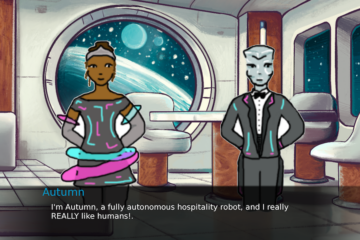In Aristotle’s Poetics, he breaks structure into two parts – the Complicating and the Unravelling, and laments that “Many poets tie the knot well, but unravel it ill.” Ancient Greek writers, I sympathize!
As a newbie writer, the biggest frustration I faced was that while it was interesting and fun to get my characters into worse and worse situations, I never knew how to get them back out of them. I lamented my own lack of imagination, of wits. “I’m not smart enough to save the day, how can I write characters who are?”
As usual, past-me was making it too hard for herself.
Use your character’s core competencies
Instead of asking, “How would I get out of this?” ask “How would THIS CHARACTER get out of this?” Your hacker isn’t going to shoot if she can hack. Your fighter is going to look for a solution she can punch. Your sex robot is going to scan the area for someone to seduce.
It’s okay if you don’t have the competencies you gave your characters. You can research how to fight or hack or seduce. You can ask someone who knows how. Or you can handily put the guts of the work in the white space between paragraphs, so long as you satisfy your reader that it is believable this character has the necessary skill and it’s believable that they used it off-screen in the time allotted.
This is where all those movies and TV shows get away with “hacking” that looks a lot like blogging as fast as you can, like someone else might be deleting the sentences as you type. The writers of the TV show don’t know how to hack, they don’t understand how in the real world it has a lot more to do with guessing passwords and convincing people to tell you their secrets than being able to code at lightning speed. The writers of those TV shows don’t HAVE to know how to hack, and we accept it, because we accept that in the world of television, this person can solve this problem by typing fast and staring frantically at their screen.
I know it feels dirty. If you feel too dirty, well, that’s where you go and do the research. Or switch the problem solving to a competency you know more about or can fake more easily.
And here’s the great thing – you can always add a new competency to a character. If you started out with a boxer character and discover you keep making puzzles for an engineer, well, maybe the boxer has an engineer in their immediate family or started out as an engineer and switched professions.
Use your time machine
There is a scene in the movie Bill and Ted’s Excellent Adventure where the titular duo are attempting to break into a police station and steal some car keys. They keep ending up cornered, then remember they have a time machine. “Hey, wait a minute, Ted, what if we had a tape recorder, and…” a tape recorder then starts playing on the far side of the room, distracting Ted’s father for a moment so they can scurry away. It’s a fun, silly scene, as more and more improbable problems are “solved” off-screen by the time machine.
We, as writers, have a time machine. We can effortlessly travel to the character’s past and hand them tools they’ll need. No one will know that escape hatch wasn’t there in draft one.
And we can move it ANYWHERE. If the parachute happening to be under the seat just before the crash is too coincidental, mention the parachute being packed two scenes earlier. This also goes for inserting that advanced degree in Nuclear Physics they need or that friend with a place they can crash for the night behind enemy lines.
Remember why you want them to escape in the first place
“But Marie,” you say, you strawman you, “If they have what they need to get out of the situation, isn’t that kind of boring? Need ax, has ax?”
Maybe. Maybe not. Why are you trying to get them out of the situation?
We don’t just back our characters into corners to torture them. (Heh heh okay we DO, but not JUST that.) Is this problem there to raise stakes? Increase tension? Showcase grace under fire or get the characters so stressed out they finally blurt their secrets? Reasons matter.
Maybe you don’t need them to escape this situation at all. Maybe they deal with the consequences of being arrested, marrying the bad guy, or falling off that cliff.
Maybe you only want a partial escape. Escape the physical peril, remain in control of the baddie? Escape the emotional turmoil, remain in physical peril?
Or you can simply elongate the time between identifying the problem and identifying the solution they have with them. Maybe they try something else first. Maybe there’s another plot beat you can put in the middle of the crisis – an ill-timed confession or emotional epiphany.
We have another, more sinister time machine at our disposal – the ability to stretch and condense time as we see fit. A minute can take an entire chapter to pass, and a year can pass between one sentence and the next. The journey of tension doesn’t have to be tied to the pacing of the actual action.
Which is all to say, sometimes it’s not as complicated a situation to get out of as you think. After all, you have a character with core competencies, the ability to hand them any tool they need, and a time machine.


